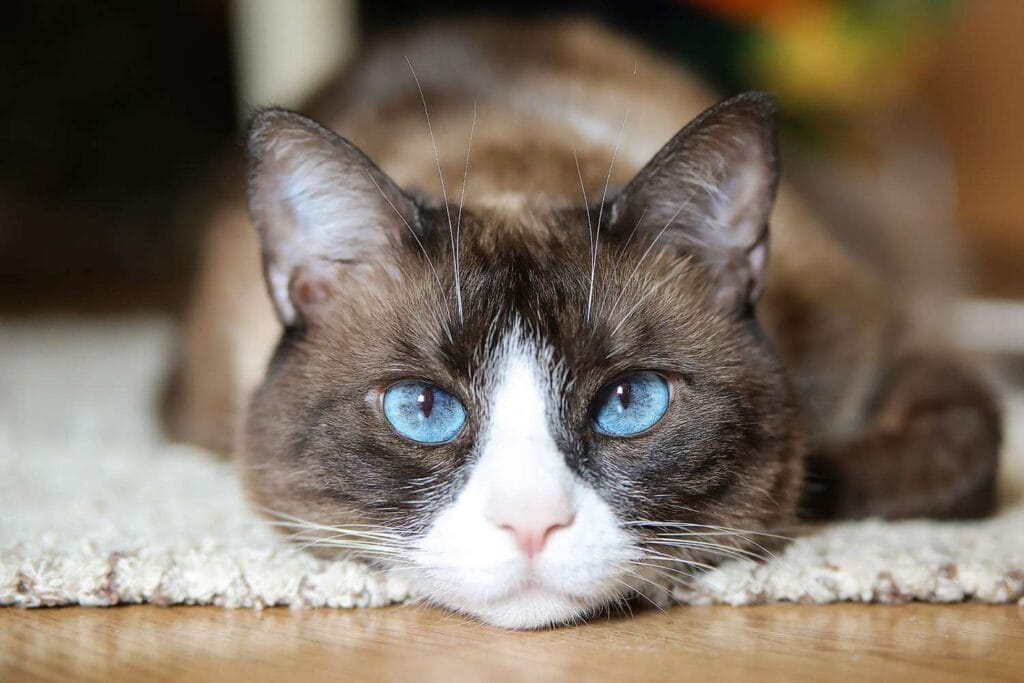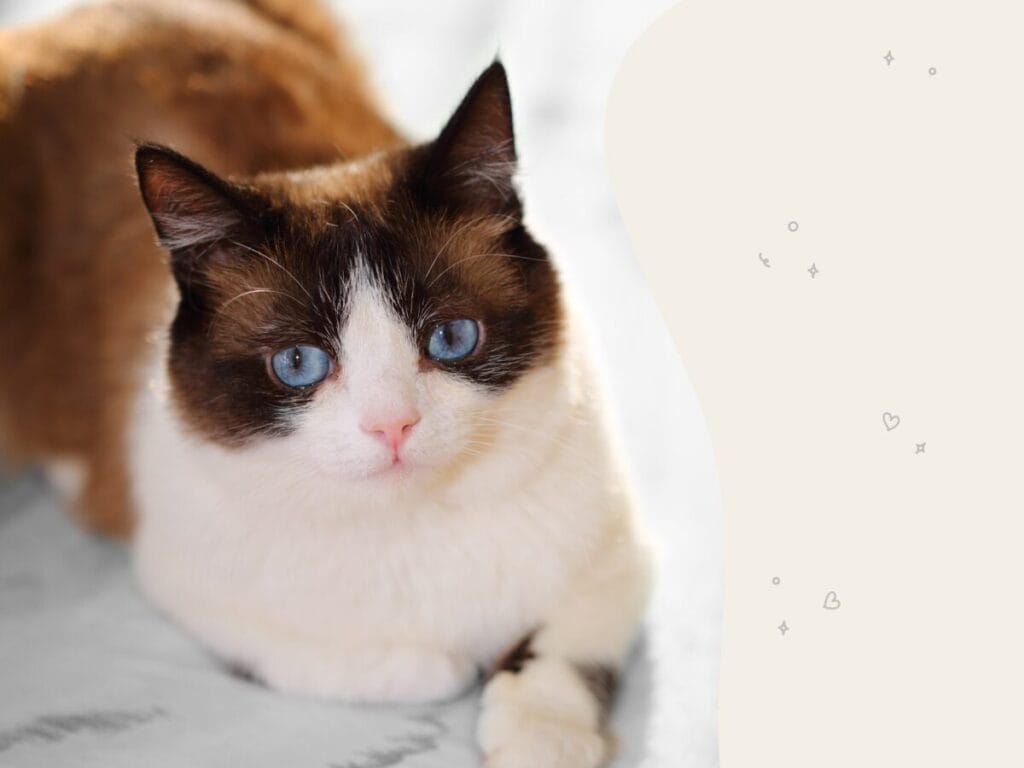The Snowshoe cat is known for its distinctive white paws which resemble snowshoes against a colored coat. Originally from the U.S., these cats make devoted and entertaining companions.
Introduction The Snowshoe Cat Breed
The Snowshoe cat originated in the 1960s from a Siamese breeding experiment in Philadelphia, Pennsylvania. Kittens were born with mesmerizing white feet which inspired the name “Snowshoe.” While their bodies resemble the Siamese, have a sweeter, more easygoing temperament. Their beautiful coat patterns and affectionate nature makes them an increasingly popular pedigreed cat.

Affectionate with Family: ⭐⭐⭐⭐⭐
Amount of Shedding: ⭐⭐
General Health: ⭐⭐⭐
Potential for Playfulness: ⭐⭐⭐⭐
Tendency to Vocalize: ⭐⭐
Kid-Friendly: ⭐⭐⭐⭐
Friendly Toward Strangers: ⭐⭐⭐
Easy to Groom: ⭐⭐⭐
Intelligence: ⭐⭐⭐
Pet Friendly: ⭐⭐⭐
- Medium-sized, muscular build
- Short, dense coat with Siamese-style markings
- Striking 4 white paws resembling
- Playful, affectionate, social personality
- Lifespan of 12-15 years
- Point color pattern coat variations
Snowshoes originated from Siamese/bicolor American Shorthair mixes. Early had recent Siamese and American Shorthair ancestors.
Caring for a Snowshoe
Diet:
- High-quality protein-rich cat food
- Wet food for increased moisture
- Digestive care formulas
Habitat:
- Tall cat trees and scratching posts
- Puzzle feeders and interactive toys
- Access to sunny windows
Grooming:
- Weekly brushing
- Nail trims every 2-3 weeks
- Check ears/teeth routinely
Enrichment: Engage their intelligence via play, environmental exploration.

Finding a Snowshoe
- Popular: U.S., Canada, UK, Scandinavia
- Price: $400 – $600
Adoption/Rescue:
- The International Cat Association (TICA)
- Local all-breed cat rescues
Pre-Adoption Checks:
- Overall health and energy
- Vaccination records
- Past medical history
Preparing for a Snowshoe
- Tips: Cat-proof home, set up food/water stations, buy puzzle toys and tall cat trees
- Care: Nutritious food, exercise through play, annual vet exams/vaccines, preventatives
- Essentials: Premium diet cat food, water bowls, scratching posts, nail clippers, toys
- Health Issues: Hypertrophic cardiomyopathy, gingivitis, obesity
- Key Vaccines: Rhinotracheitis, calicivirus, panleukopenia virus, rabies

Popular Snowshoe Cat Names
Names related to snow/winter or inspired by their white feet suit them nicely.
Examples: blizzard, powder, flurry, mittens, socks, bootsy
“Do Snowshoes like the outdoors?”
While curious, they’re satisfied indoors given ample play, vertical space and enrichment.
“Are Snowshoe cats intelligent?”
Yes, can readily learn tricks, play fetch, solve puzzles when motivated.
“How many Snowshoe types?”
Just one breed with point color patterns of seal, blue, chocolate, lilac, red.
“How to stop biting?”
Redirect biting to toys, firmly say no, ignore after, and praise gentle play.
“How to curb Snowshoe scratching?”
Provide scratch posts, trim nails regularly, use calming synthetic pheromone plugins.
“Tips for friendly Snowshoe socialization?”
Gradually positively introduce new sights/sounds/people/animals from 7-16 weeks old.
“How to train a cat?”
Use rewards like treats, praise and play to motivate learning cues like sit and stay.
“Recommended vet visits?”
Annual wellness checks are advised plus immediate visits for any emerging conditions.
“Are cats good family pets?”
Yes, their affectionate personality allows close bonds with all family members.
“Good cats with children?”
Yes, their energetic and tolerant nature makes them great playmates for gentle kids.
“Cats compatible other pets?”
Yes, early, proper introductions facilitate peaceful coexistence with other household pets.
“Can cats cause allergies?”
While not hypoallergenic, their short coats produce less dander than long-haired breeds.
“Are cats aggressive?”
No, have very sweet, gentle dispositions when positively socialized.
“Do cats have hair loss issues?”
No, their short dense coats are low-shedding and not prone to excessive hair loss conditions.
Are you a cat lover who wants to learn more about your furry friends? Do you want to find the best cat food, cat care tips, and resources for your cats? If so, you’ve come to the right place! Welcome to Cat Food Site, the ultimate website for cat enthusiast.
Here you will find everything you need to know about cats Breed, from their health and behavior to their breeds, cat diet and names. You will also discover the latest cat news, cat nutrition, trends, and memes from around the web.

